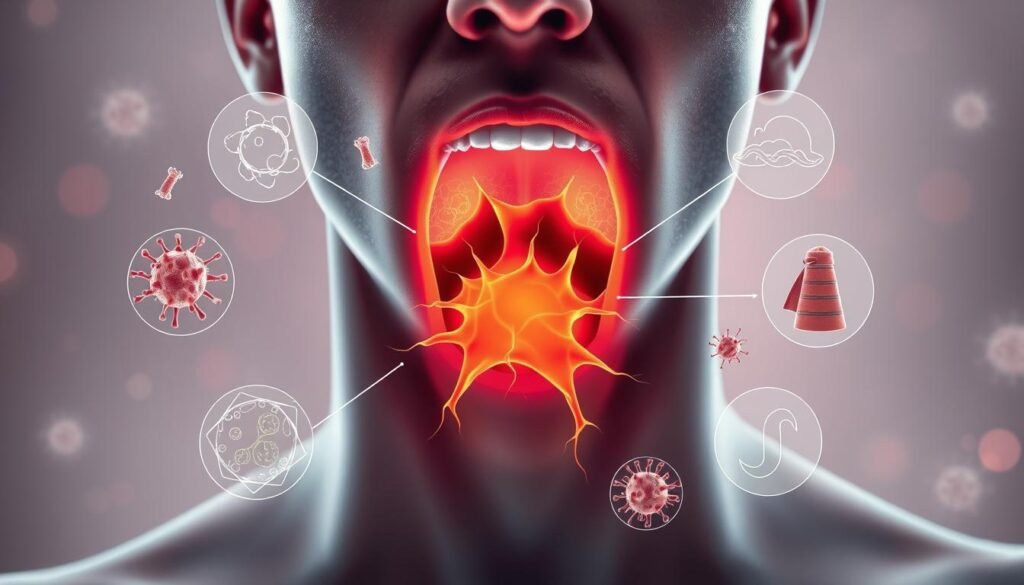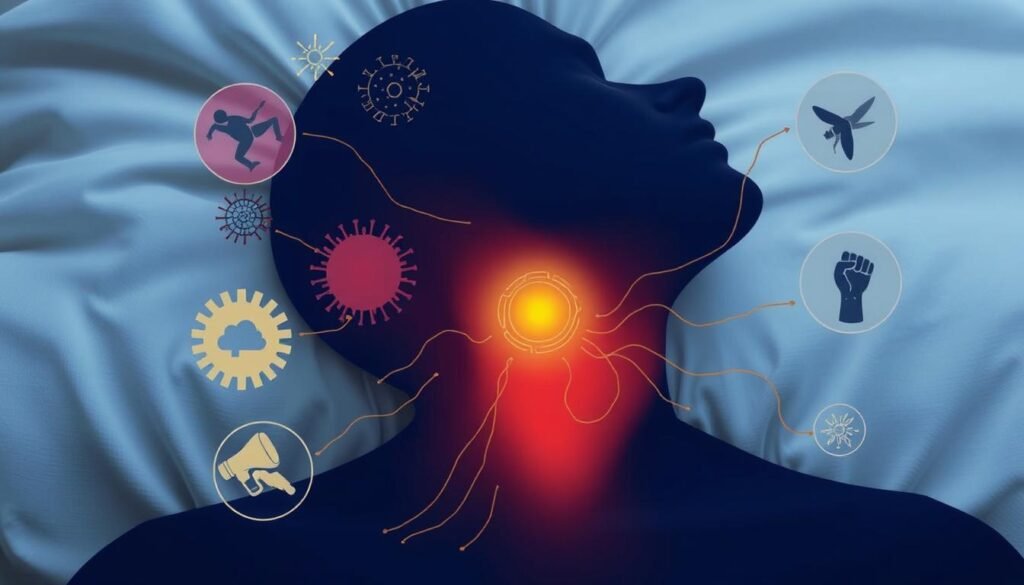Did you know around 15% of people may get chronic headaches from cervical spine problems? This surprising fact sheds light on the common issues of stiff neck, sore throat, and fatigue. These symptoms can be key signs of various health conditions, including throat infections or sinusitis.
Understanding the link between these symptoms is key. A stiff neck and sore throat might be part of bigger health issues. These include headache and fatigue but no fever, and they deserve a closer look by a doctor.
We’re going to explore the causes of stiff neck and sore throat further. We’ll look at why they happen and how important it is to get medical advice early. For more on common symptoms and what they mean, staying informed is crucial. For more help, visit this article.
Key Takeaways
- A stiff neck and sore throat may indicate various underlying medical conditions.
- Chronic headaches can stem from cervical spine issues affecting approximately 15% of the population.
- It is vital to monitor symptoms and seek medical attention if they escalate.
- Viral infections commonly cause sore throats, accounting for about
Understanding Stiff Neck and Its Symptoms
Many people feel a stiff neck now and then. In fact, more than 30% of people report neck pain each year. This issue can make moving your neck hard, causing pain during everyday tasks.
Other signs of a stiff neck can show up with ailments like a sore throat. In adults, COVID-19 has also been linked to muscle pain and neck stiffness. Whether mild or severe, this discomfort from COVID-19 usually goes away after a few days or weeks. But staying inactive for too long can make it last longer.
Several things can lead to neck pain and a sore throat, like:
- Sleeping in an awkward position
- Poor posture
- A pinched nerve
- Muscle spasms
- Arthritis
- A herniated disk
- Cervical spondylosis
- Fibromyalgia
Some symptoms mean you should see a doctor right away. If you have a bad headache, high fever, feel sick to your stomach, sensitive to light, or confused, get help. These could be signs of something serious, like meningitis. Getting checked out fast is key to avoid big health problems.
Knowing more about stiff necks and related symptoms helps. It lets people make better choices about their health and get help when it’s needed.
Sore Throat: Causes and Symptoms
A sore throat can stem from many sore throat causes. These are mainly viral or bacterial infections. Viral infections include the common cold and COVID-19, leading to mild symptoms. These often get better within a week. On the other hand, bacterial infections like strep throat cause worse symptoms. They need specific treatment.
Common stiff neck and sore throat symptoms are redness, swelling, and throat irritation. People may also have fever, swollen lymph nodes, and feel tired. Strep throat hits kids aged 5-15 years hard. It shows up as a bad and quick sore throat, often with high fever and swollen lymph nodes.
Other problems, like allergies or a common cold, can seem like a sore throat. Allergies cause symptoms to stay as long as the allergen is around, while cold symptoms often go away in a few weeks.
If symptoms get worse or come with a sudden fever, headache, or stiff neck, get medical help fast. These could be signs of something serious like bacterial meningitis. In conditions like mono, symptoms can stick around for weeks. This shows the importance of watching symptoms closely and maybe getting tests done.
To manage well, people should pay attention to their symptoms. They should talk to doctors if they think there’s a serious problem. Knowing the difference in sore throat kinds helps with getting the right treatment and care.

Headache and Fatigue: Their Connection
Headaches and fatigue are common problems that often occur together. This can be tough for those who experience them both. For example, around 836,000 to 2.5 million Americans suffer from chronic fatigue syndrome (CFS). In CFS, people feel extremely tired for more than four months and often have a lasting headache. This makes treating symptoms like a stiff neck and sore throat very important.
Studies show many factors can make headaches and fatigue worse, especially in those with no fever. For instance, about 80% of people with fibromyalgia also get frequent headaches. Also, 50-75% of individuals with major depression suffer from both chronic fatigue and headaches. Hormonal changes are another big reason, causing migraines in about 30% of women which can also affect how tired they feel.
Lack of sleep and not drinking enough water are big reasons for both headaches and fatigue. Sleep disorders impact 50-70 million Americans, highlighting the need for good sleep. About 5-10% of people may have headaches caused by not drinking enough water. So, staying hydrated is key.
Viral infections like the flu and COVID-19 often bring headache and fatigue, too. About 80% of those sick with these viruses will have both symptoms. This shows why it’s important to know and watch out for these signs. For those wanting more info on how to stay safe and the differences between colds, flu, and COVID-19, visit the OSF Healthcare blog for details.
Exploring the Symptoms of Stiff Neck, Sore Throat, Headache Fatigue No Fever
Knowing the symptoms of a stiff neck, sore throat, and fatigue is key. It helps you tell apart common illnesses from serious ones. Here are the symptoms to watch for and advice on when to see a doctor.
Common Symptoms to Look For
- Sore Throat: It usually hurts or feels uncomfortable to swallow.
- Stiff Neck: Turning your head might be painful or hard.
- Fatigue: You may feel really tired, even after resting well.
- Headache: The other symptoms can come with mild to moderate headaches.
- No Fever: Not having a fever can set these symptoms apart from the flu or COVID-19.
For relief from a stiff neck and sore throat, try some home remedies. Warm compresses and staying hydrated can help ease the pain.
When to Seek Medical Attention
If symptoms get worse or if you notice new ones, it’s time to see a doctor. Important signs to watch for include:
- Pain in your neck or throat that gets worse
- Bad headaches that normal medicine doesn’t fix
- Feeling very tired for more than two weeks
- Getting a fever or other new symptoms
Spotting these early can help you get the right treatment quickly. Keeping an eye on your health is a smart way to stay safe.

Potential Causes of Stiff Neck and Sore Throat
Knowing why you have a stiff neck and sore throat can help fix it. Many health issues, like infections, can cause these symptoms. By understanding the different causes, you can find the right treatment.
Infections: Viral vs. Bacterial
Infections are often to blame for sore throats, coming from viruses or bacteria. Viruses, like the flu and colds, cause most adult sore throats. Each year, the flu hits 10% to 20% of people. Bacterial infections, like strep throat, affect up to 30% of kids and 15% of adults. Tonsillitis, which both viruses and bacteria cause, affects many.
Other Medical Conditions
Other health issues can also cause these problems. Allergies are a big factor, especially during certain seasons. GERD, affecting 40% of those with sore throats, is another cause. Chronic neck pain, often from muscle strain or injuries like whiplash, is common too. Serious illnesses like meningitis also make the list, so it’s important to tell them apart to choose the right treatment.

| Condition | Cause | Symptoms | Prevalence |
|---|---|---|---|
| Viral Infection | Influenza, Common Cold | Sore Throat, Cough, Fatigue | 50%-80% of cases |
| Bacterial Infection | Group A Streptococcus | Strep Throat, Pain on Swallowing | 15%-30% in children, 5%-15% in adults |
| Tonsillitis | Viral or Bacterial Infection | Swelling, Difficulty Breathing | 50% of cases |
| Allergies | Airborne Allergens | Sore Throat, Itchy Eyes | Over 50% in seasonal contexts |
| GERD | Acid Reflux | Sore Throat, Cough | 40% of patients |
Diagnosis and Tests for Symptoms
Getting a right diagnosis is key for treating a stiff neck and sore throat. Doctors start with checking the patient’s health history and their symptoms. This helps find common issues like infections or muscle strains causing the discomfort.
Special tests are needed if a virus or bacteria might be the cause. For really bad sore throats or ongoing tiredness, blood tests are done. For instance, the Monospot test checks for mono, which gives you a sore throat, swollen glands, and makes you very tired.
Sometimes, doctors use X-rays or ultrasounds. These are for when they think there might be a serious problem. These tests show problems in the neck or throat that cause stiffness or pain.
Knowing what the test results mean is important. For example, too many white blood cells usually mean an infection. But if tests find nothing, the pain might be from a muscle strain. Knowing exactly why you’re hurting helps find the best way to feel better.
| Symptom | Possible Tests | Results Indicating |
|---|---|---|
| Sore Throat | Throat culture, Rapid strep test | Presence of strep bacteria |
| Stiff Neck | Physical examination, Imaging if necessary | Muscle strain or potential neurological issues |
| Fatigue | Blood tests | Infection or mononucleosis presence |
| Fever | Blood tests, Monospot test | Infectious mononucleosis or other infections |
Home Remedies and Treatments for Relief
Finding home remedies for stiff neck and sore throat is key. They boost comfort during recovery. Many seek natural relief along with medications to manage symptoms. Simple practices can yield significant benefits.
Natural Remedies for a Stiff Neck and Sore Throat
Home remedies for these ailments include comforting treatments. For a stiff neck, a warm compress can help muscles relax. Gently stretching can also relieve tension.
For a sore throat, soothing liquids are beneficial. Warm teas, honey, and salt water gargles are effective. Honey soothes with its natural sweetness. Gargling salt water helps reduce swelling and kill bacteria.
Over-the-Counter Medications
Over-the-counter meds are crucial for symptom relief. Ibuprofen and acetaminophen manage pain from a stiff neck or sore throat well. They are reliable and help ease discomfort during sickness.
Antibiotics are not often given for sore throats unless bacteria is confirmed. Viral infections are usually the cause, so home remedies and pain relief are adequate. For alternatives, herbal options like slippery elm or marshmallow root can soothe the throat. These can be added to treatments at home.
When to Consult a Healthcare Professional
It’s important to know when to get medical help for a stiff neck and sore throat. Certain signs mean you should see a doctor right away. Spotting these early can lead to quick and effective treatments.
Signs Indicating a Serious Condition
Some symptoms are red flags and need fast action. These include:
- High fever: A fever over 103°F for adults or 104°F for kids is serious.
- Severe neck pain: Pain that won’t go away or causes weakness needs checking.
- Difficulty swallowing or breathing: Trouble breathing or swallowing means you need urgent care.
- Presence of pus: Pus in the throat can signal a bacterial infection that needs quick treatment.
- Rashes or other skin symptoms: A rash with a sore throat should be looked at by a doctor.
- Signs of dehydration: Blue skin or lips are emergency signs that cannot wait.
Common Procedures for Diagnosis
Doctors use certain methods to find out what’s wrong:
| Procedure | Description |
|---|---|
| Physical examination | They check your throat and neck for infection signs or anything unusual. |
| Throat culture | A throat swab can show if there’s a bacterial infection. |
| Blood tests | Blood work helps see your overall health and check for infections or diseases. |
| X-rays or MRI | Imaging tests might be needed to look at the neck more closely. |
Getting a full check-up can really help with stiff neck and sore throat. It also checks for other health issues. Knowing when to get checked and what to expect helps you make smart health choices.
Conclusion
Knowing the signs of a stiff neck, sore throat, headache, and fatigue helps you manage your health. This article shows that these symptoms often link together, pointing to health issues that need attention. For example, adults with ongoing headaches should talk to doctors, especially if over 50 or seeing other alarming signs.
The chance of having strep throat or rheumatic fever should not be ignored. If left untreated, these infections can cause serious problems.
Having this knowledge lets people take charge of their health. Knowing when to get medical help and what these symptoms might mean is key. This is particularly true if someone constantly feels tired and has headaches but no fever. It might indicate a bigger health issue.
In the end, though these symptoms can be harmless, acting quickly and carefully is the best approach. Always deal with these health concerns with caution to stay well.